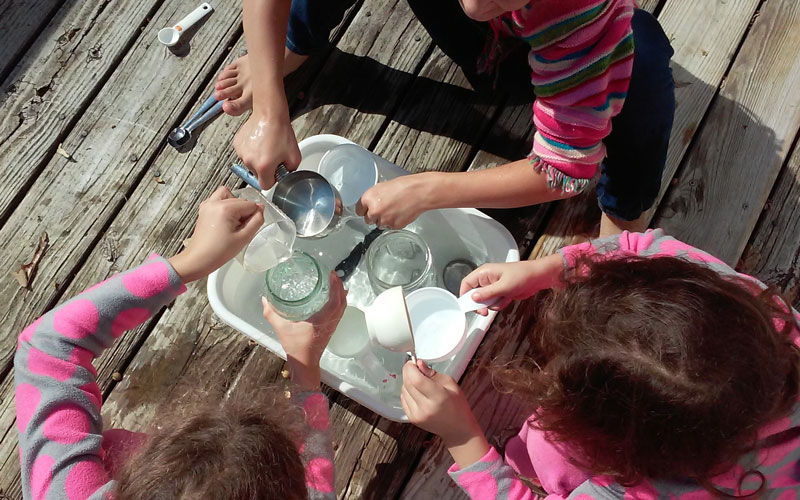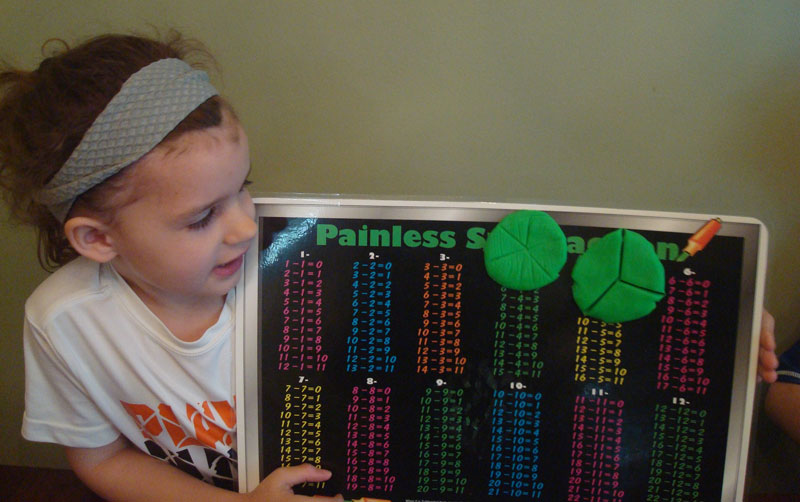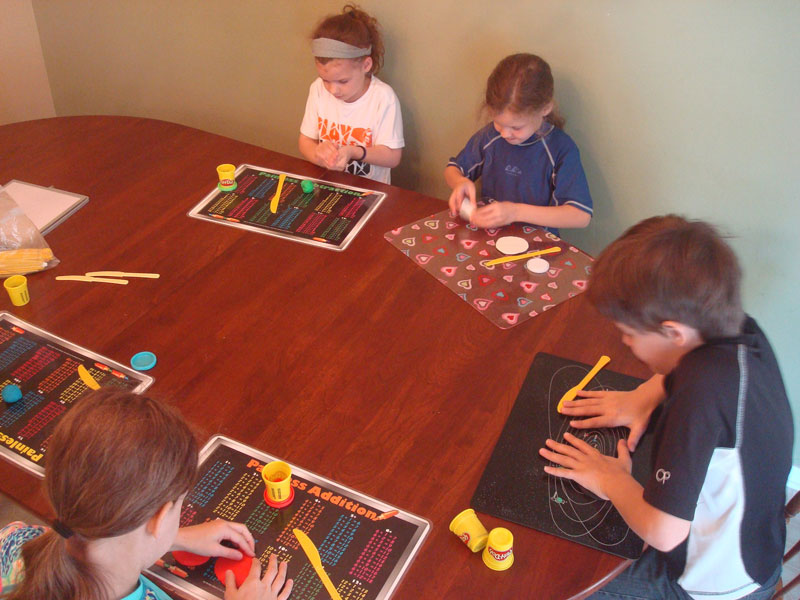
The 2015-2016 school year was a particularly rough one for us. My seventh little one turned a year old in the middle of the year, and yet, I never seemed to regain my energy. I was exhausted and, as a result, very low emotionally.

It was also the first year we’d had four children officially homeschooling and I was overwhelmed. There is so much good that can be done in a homeschool day. But very often, the bottleneck, the thing that slows the flow of activity, is that there is only one mama.
This problem is only compounded when that mama is exhausted and overwhelmed. Maximizing the use of mama’s time is the key to homeschool survival. And one of the best ways to do that is to learn all together in a group. But that doesn’t work with Math, right?
What Wasn’t Working
I had four different kids in four different textbooks. I spent all of the time allotted for math in a cycle like this:
- Go over the instructions for today’s math page with each child.
- Play ringmaster over a table full of antsy children to get them to complete their math page.
- Check the math pages and make corrections.
- Hand the corrections back to the disappointed child and ask him to go back and fix his mistakes.
- Repeat steps 2-4 until everyone really hates math. Do it again tomorrow.
And sometimes, the backlog of math was so bad that I didn’t get to make corrections until the evening. So then the children were greeted the next day with an ugly sheet of corrections from the day before PLUS a brand new sheet of that day’s math problems.
Math didn’t look at all like I had once envisioned math to be in a homeschool. I thought we’d spend lots of time with hands-on exploration. I envisioned discussion about how and why math works. I thought we’d enjoy discoveries together. But there was no time for that if we were going to get all of those workbook pages done.
What is Next
One of the books that had a profound impact on me during the dark days of that school year was Sarah Mackenzie’s Teaching from Rest (which I listened to Sarah herself read aloud to me on audiobook!). But the piece that had the most profound effect on our math was from a recorded interview she did with Andrew Kern of the Circe Institute.
Mr. Kern was talking about children being “behind” in their studies. He said that this concept was really only relevant if you were comparing your children to other children. And obviously, that can cause a lot of unnecessary anxiety in the homeschool.
Instead, he said that as we educate our children (in any subject) the relevant questions are …
To what level has my child mastered this skill? And what is next? Nothing else matters.
It sounds so simple when you put it like that! In it’s most basic form, textbooks provide us with the tools for answering these questions.
- They offer a way to assess to what level a child has mastered a skill.
- They tell us what is next.
- They provide a way to teach that next topic.
Please hear me: I’m not anti-textbook. But I am anti-continuing-to-do-something-that-isn’t-working. And for us, four different kids in four different textbooks wasn’t working. Teaching kids that “math” begins and ends with the drudgery of pushing a pencil (and then an eraser, and then a pencil again) across a sheet of paper was definitely not working.
The Vocabulary of Math
We’re all familiar with reading aloud as a family or learning history together. Little people can watch science experiments right along with the older kids. But what about math?
It is true that math is a sequential subject. And learning concepts can be dependent on developmental readiness. But perhaps we can wrap our minds around a group approach if we remember that math, at its core, is simply a language, a way of communicating ideas and relationships.
We understand that a certain level of developmental readiness is necessary for reading and spelling. And yet, we are not afraid to engage with our children using words they can neither read or spell.
My two year old can’t identify any letters. But I have zero doubt that he has a thorough understanding of words like “banana” and “outside”. Imagine if you only spoke words to your children that you were sure they were ready to read. Or only read aloud to children using words you were sure they were developmentally ready to spell.
Cognitive vocabulary precedes spoken vocabulary. Spoken vocabulary precedes written vocabulary. Math is no different. Children don’t have to be able to identify or write numerators and denominators in order to get what “half” a cookie is.
Simultaneous Learning, Differentiated Practice
So if they can all engage in the conversation of math, but are prepared, at different levels, to read it and write it, how do you proceed? Cheer up; you already know how to do this!
When you read aloud a book or story to your children, you differentiate automatically because you know your children. You might ask your four-year-old if she remembers the name of the boy. The six-year-old could tell about where he went. And the ten-year-old might be ready to discuss why it was funny that he made the choices he did.
For the four-year-old, the follow-up discussion is probably sufficient. The six-year-old might draw a picture or find a place on a map. Maybe the ten-year-old can write an alternate ending or complete some copy work.
You already differentiate! Math can be worked just the same. Talk together. Then differentiate in the follow-up practice.
The Nuts and Bolts
So, maybe this sounds good in theory, but you’re wondering what this looks like in action. Do you want the short answer or the long answer?
The short answer is, learn and discuss together and then follow up with …
- everyone doing practice work from their own grade-level textbook
- everyone doing a custom-generated review sheet at their own level
- everyone doing online practice at their own level
- The Ultimate Guide to Relaxed Poetry in Your Morning Time - April 27, 2020
- Holiday Time when Your Family is Anti-Homeschool - November 15, 2018
- When Skill Learning Gets Messy - October 11, 2018


